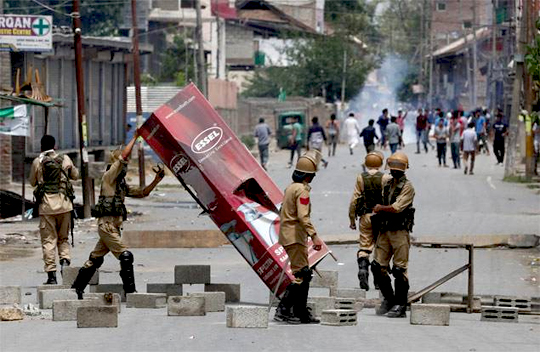Srinagar, Jul 10: Normal life was hit for the second day today in Kashmir Valley due to curfew-like restrictions and strike following the killing of Hizbul Mujahideen commander Burhan Wani.

The restrictions have been imposed in most of Kashmir Valley as a precautionary measure.
Restrictions have been imposed in most areas of Srinagar city and four districts of south Kashmir, officials said.
They said the decision to impose restrictions was taken to maintain law and order in the Valley.Yesterday, the restrictions were imposed only in some parts of Srinagar, Pulwama and Anantnag districts.
Meanwhile, the separatist-sponsored strike, which was extended for two more days yesterday, also affected normal life in the Valley.
Shops, private offices, business establishments and petrol pumps were shut, while government offices and banks witnessed thin attendance, the officials said.
They said public transport was completely off the roads, while cars and auto-rickshaws were seen plying at few places where there were no restrictions.
Educational institutions in the Valley were closed on account of the ongoing summer vacations.
The separatist groups yesterday extended the strike to protest the killings of civilians in alleged firing by security forces.
Meanwhile, Central University of Kashmir (CUK), Islamic University of Science and Technology (IUST) and Jammu and Kashmir Board of School Education (JKBOSE) have postponed the examinations due to the prevailing situation in the Valley.
"IUST has also postponed all the examinations scheduled for July 11 and 12. New dates will be notified separately," an official of the University said.
The Board of School Education (Kashmir division) has postponed the entire Examination of Class 11 regular (term Ist) 2016, a BOSE spokesman said.
He said a revised date sheet on this behalf shall be issued later on.
Meanwhile in a statement issued here late last night, Chief Minister Mehbooba Mufti urged the Centre to reach out to the people of Jammu and Kashmir to resolve the issues confronting the state through reconciliation efforts on internal as well as external front for ending the violence that has left behind a trail of death and destruction.
The pain of Kashmiris has reached a level where the hope of peace is sure to gain substantial local support if tangible confidence building measures are taken to address the issues concerning the state and its people, the Chief Minister said.
Mehbooba said the people of Jammu and Kashmir, irrespective of their age, gender, status or the political affiliation, have been suffering the terrible consequences of the pernicious turmoil over the last more than two decades.
They now want peace and stability to take roots, and even within the prevailing circumstances there lies an opportunity to consolidate the peace efforts, if substantial steps are taken in the right direction to positively impact the ground situation, she said.
The Chief Minister stressed on the need and urgency for reviving the peace and reconciliation initiatives, both on the internal and external fronts.
Seeking people's cooperation in stabilising peace, Mehbooba said the Government is responsive to the people's needs and concerned about their problems and is working judiciously and in a transparent manner to fulfil their aspirations and expectations.
Flagging the problem of unemployment as a matter of grave concern, she said every section of the society including individuals, institutions and organisations, have to be brought together in a spirit of creative enterprise to widen the economic and employment space for the State's youth and channelise their energies productively.
While reacting to the civilian deaths in security forces' firing yesterday, Mehbooba had asked security forces to follow the standard operating procedures for crowd control and avoid disproportionate use of force.
"Disproportionate use of force for crowd control results in loss of precious lives and grave injuries which should be avoided at all costs," she said asking the police and the paramilitary forces to use Standard Operating Procedure (SOP) while dealing with protesters to avoid loss of precious human lives or injuries.
Urging for calm, Mehbooba sought people's cooperation in restoration of normalcy in the Valley.
Violence only brings miseries to the people and tragedies for the victim families, she said.
The Chief Minister appealed to the people, especially the youth not to fall prey to the machinations of the vested interests, who play politics over the bodies of Kashmiris





Comments
Add new comment